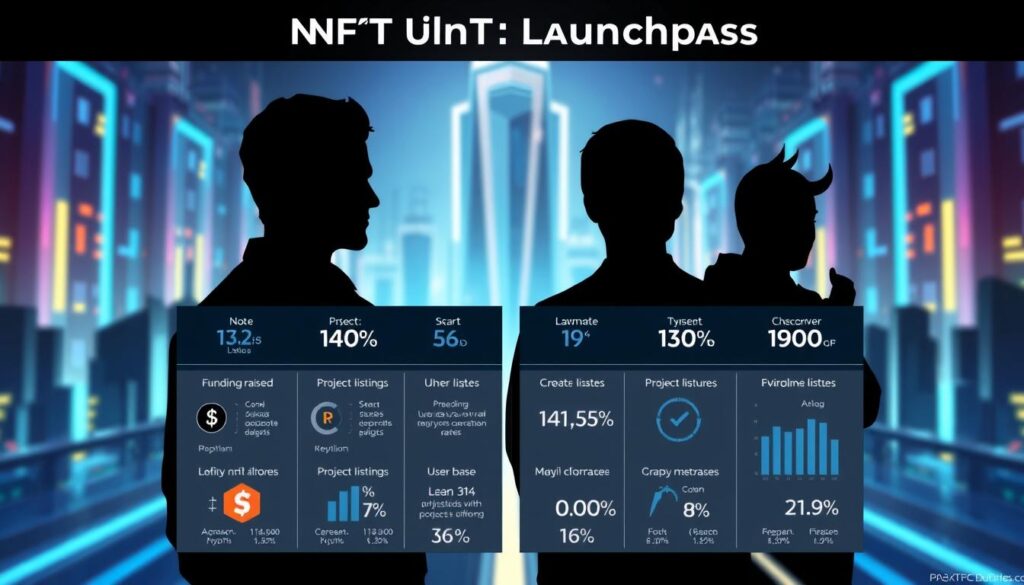Specialised fundraising platforms have transformed how blockchain initiatives secure capital in today’s digital economy. These dedicated spaces connect creators with supporters through structured fundraising events.
Modern platforms offer comprehensive support beyond simple capital raising. They provide essential services like compliance assistance, investor vetting, and tokenomics guidance. This ensures both parties engage in secure, regulated environments.
The evolution from basic fundraising tools to complete ecosystems represents significant progress. Today’s offerings include community building, marketing support, and post-launch assistance. This holistic approach increases success rates for digital ventures.
Choosing the right platform significantly impacts fundraising outcomes and long-term viability. Three primary models—ICOs, IDOs, and IEOs—each offer distinct advantages for different scenarios. Understanding these options helps stakeholders make informed decisions.
Key Takeaways
- Specialised platforms facilitate secure fundraising for blockchain initiatives
- Modern services extend beyond capital raising to comprehensive support
- Platform selection critically influences project success and compliance
- Three primary fundraising models serve different organisational needs
- Contemporary offerings include compliance frameworks and security audits
- These ecosystems provide marketing assistance and community building
- Understanding platform options helps stakeholders navigate complex landscapes
The Current Landscape of Token Sales and NFT Launchpads
Contemporary fundraising environments for digital assets now prioritise quality and regulatory adherence over speculative hype. The market has matured significantly, with established platforms implementing rigorous vetting processes.
Market Overview and Trends
Recent data reveals substantial growth in the fundraising ecosystem. Leading platforms facilitated over 116 initiatives in 2024 alone, demonstrating robust market activity.
Average returns ranged between 120% and 260%, indicating strong investor confidence. This performance reflects improved due diligence and project selection criteria.
The crypto space continues to diversify with specialised platforms emerging for different blockchain sectors. This specialisation allows for deeper expertise and better support for specific types of blockchain projects.
Regulatory and Compliance Environment
Compliance frameworks have become a critical differentiator among fundraising platforms. Robust KYC/AML procedures and security audits are now standard requirements.
Platforms must navigate complex cross-border regulations while ensuring token offerings meet local securities laws. This regulatory sophistication provides investors with greater protection and reduces legal risks associated with digital asset purchases.
Benefits and Features of Token Launchpads
Contemporary blockchain fundraising solutions offer integrated support systems for sustainable growth. These ecosystems provide comprehensive services that extend far beyond initial capital raising.
Enhanced Compliance and Security Measures
Reputable platforms implement rigorous compliance frameworks to protect all participants. Thorough KYC procedures verify investors while smart contract audits identify potential vulnerabilities.
Third-party security verification mechanisms like Chainlink VRF can increase trust by 42%. This robust approach ensures offerings meet securities regulations across multiple jurisdictions.
Community Building and Post-Launch Support
Successful platforms facilitate ongoing engagement between initiatives and their community. They provide tools for communication, governance participation, and reward programmes.
Premium support includes exchange listings, liquidity solutions, and marketing assistance. Platforms like CoinList offer investor relations services while TokenMinds provides comprehensive sales support.
This holistic approach maintains community interest and accelerates long-term growth for digital ventures.
Exploring the NFT Launchpad Project Token Sale
Blockchain fundraising has evolved distinct models for capital acquisition, each with unique operational frameworks. These mechanisms dictate how digital assets are distributed to early supporters.
Understanding these processes is crucial for both creators and participants. It ensures informed decisions and successful fundraising events.

Key Mechanics of Token Sales
The landscape is dominated by three primary fundraising approaches. Each offers different advantages for various scenarios.
Initial Coin Offerings (ICOs) represent a direct method for raising capital. They provide broad access to a global pool of investors.
This wide reach, however, comes with increased compliance responsibilities. Projects must navigate complex legal frameworks across jurisdictions. You can learn more about the history of this model in our guide to initial coin offerings (ICOs).
- Initial DEX Offerings (IDOs): These leverage decentralised exchange infrastructure. They provide immediate liquidity and foster greater community involvement through permissionless participation.
- Initial Exchange Offerings (IEOs): Conducted on centralised exchanges, these benefit from the platform’s security and credibility. The exchange manages technical aspects and provides instant access to its user base.
Platforms like CoinList have developed innovative hybrid models. These include auctions and tiered access systems to ensure fair distribution.
Practical elements like vesting schedules and whitelisting are also critical. They help manage participant expectations and ensure a smooth process from announcement to final distribution.
Evaluating Launchpad Platforms and Their Offerings
Effective platform evaluation demands systematic assessment across five critical dimensions. Business leaders should consider how each element aligns with their specific requirements and long-term objectives.

The selection process begins with project fit. Different platforms specialise in various sectors like GameFi or DeFi. Choosing one that understands your niche ensures better support and community alignment.
Fundraising Models: ICO, IDO, IEO
Each fundraising approach offers distinct advantages for different scenarios. ICOs provide broad investor access but require significant compliance effort.
IDOs leverage decentralised exchange infrastructure for immediate liquidity. IEOs benefit from centralised exchange security and established user bases.
The optimal choice depends on your timeline, regulatory capacity, and target investor demographics.
Platform-Specific Services and Ecosystem Tools
Leading platforms differentiate themselves through comprehensive service offerings. These include integrated DeFi functionality and advanced community management tools.
Critical evaluation points include compliance frameworks, security audits, and post-launch support commitments. Platform reputation and historical performance data provide valuable insights into reliability.
Community engagement features like referral systems and reward mechanisms sustain long-term participation beyond initial fundraising events.
Comparative Analysis of Leading Launchpads
Comparative analysis of top fundraising venues highlights how strategic platform selection impacts venture outcomes. Each major ecosystem offers unique advantages tailored to specific blockchain sectors and fundraising goals.

Case Studies: Binance, Seedify, and DAO Maker
Binance’s platform launched 52 initiatives in 2024, focusing on broad Web3 ventures requiring substantial liquidity. Their global reach and strong compliance frameworks attract large-scale digital ventures.
Seedify specialises in gaming and creative digital assets with 26 ventures launched last year. Their tiered access system rewards committed community members within niche sectors.
DAO Maker’s hybrid approach combines social mining with traditional fundraising methods. They facilitated 38 ventures in 2024, achieving impressive 3.2x average returns for participants.
Data Insights and Performance Metrics from 2024
Recent data reveals significant performance variations across different fundraising ecosystems. Established platforms consistently deliver stronger results compared to emerging alternatives.
Average returns ranged between 120% and 260% across major venues. This demonstrates the importance of platform reputation and historical track records.
Contrasting case studies highlight critical success factors. One DeFi initiative raised $15 million through community-building tools, while another gaming venture failed due to inadequate liquidity provisions.
Investor Considerations and Market Sentiment
Potential backers must carefully evaluate multiple factors before committing capital to digital asset offerings. Understanding market dynamics and risk profiles helps make informed decisions.

Assessing Investor Engagement and ROI Potential
Different platforms offer varied participation models for investors. Tiered systems based on platform holdings determine access levels to premium offerings.
Historical data reveals impressive return potential. While average returns range 120-260%, exceptional cases demonstrate much higher performance.
| Initiative | Current ROI | ATH ROI |
|---|---|---|
| Solana | 45.2x | 881.0x |
| Ondo Finance | 8.7x | 13.3x |
| NEAR Protocol | 3.2x | 5.67x |
| Immutable X | 2.1x | 3.31x |
Market Volatility and Risk Mitigation Strategies
The crypto market experiences significant price fluctuations. Prices can change dramatically during the first week after launch.
Sophisticated investors employ several risk management approaches. Diversification across multiple offerings reduces exposure to single initiatives.
Using platforms with strong compliance frameworks provides regulatory protection. Non-custodial wallets maintain asset control while ensuring security.
Evaluating liquidity provisions is crucial for exit strategies. Platforms with established exchange partnerships offer better access to trading opportunities.
In-Depth Look at Platform Data and Success Metrics
Sophisticated data analytics provide crucial insights into platform performance and investment opportunities. Understanding these metrics helps stakeholders make informed decisions based on objective performance indicators rather than speculation.
Ranking, Trending and Active Token Sales
Platform rankings incorporate multiple performance factors into a comprehensive scoring system. The formula considers ROI metrics, fundraising volume compared to market totals, and price stability during the first trading week.
Additional factors include the ratio of tokens sold versus released at TGE and the platform’s share of total marketplace activity. This multi-dimensional approach creates organic rankings that reflect true platform effectiveness.
Designations like “Trending” identify platforms currently attracting high user interest with strong performance. “Hot” labels indicate elevated activity level, while “New” tags mark recently added platforms offering emerging opportunities.
Minimum activity thresholds ensure meaningful rankings. TOP 10 platforms require at least 20 completed initiatives, TOP 20 need 10, and TOP 30 require 5. This ensures platforms have sufficient track records for proper evaluation.
Investors can filter dashboards to view “Active” and “Upcoming” opportunities. This functionality helps plan participation strategies and conduct due diligence in advance of fundraising events.
Category performance data reveals varying success rates across different sectors. Blockchain service initiatives typically achieve higher scores than other categories, demonstrating distinct investor appeal patterns.
The TGE sell-through ratio serves as a critical success indicator. Higher ratios demonstrate strong market demand and appropriate pricing, while lower figures may signal valuation issues or insufficient investor interest.
Conclusion
Modern blockchain initiatives face complex decisions when selecting optimal distribution channels for their digital offerings. The right platform choice directly impacts fundraising outcomes and long-term viability.
Strategic selection depends on specific business requirements, target investor demographics, and regulatory considerations. Large-scale ventures may prefer platforms like Binance, while specialised offerings suit niche sectors.
Successful token distribution extends beyond initial sales events. It requires careful planning of allocation percentages and vesting schedules that balance immediate liquidity with sustainable growth.
The cryptocurrency ecosystem continues evolving with AI-driven tools and advanced compliance features. Forward-looking evaluation should consider a platform’s innovation commitment and adaptation capabilities.
Ultimately, thorough platform assessment reduces risks while maximising returns. This strategic partnership establishes foundations for sustainable success in the dynamic blockchain landscape.
FAQ
What are the primary fundraising models used by platforms like Binance Launchpad?
The main models are Initial Coin Offerings (ICO), Initial Dex Offerings (IDO), and Initial Exchange Offerings (IEO). Each has distinct mechanics concerning token distribution, liquidity provision, and the level of exchange support offered to ventures.
How do these platforms enhance security for participants?
They implement rigorous Know Your Customer (KYC) procedures and compliance checks. This helps verify investor identities and ensures offerings meet specific regulatory requirements, thereby protecting funds and reducing fraud.
What kind of post-launch support can investors expect?
Beyond the initial fundraising event, many services provide ongoing community management, marketing assistance, and technical guidance. This support aims to sustain long-term growth and engagement for the digital assets launched.
What factors should one consider before participating in an offering?
Key considerations include the project’s fundamentals, the vesting schedule for token distribution, the amount of liquidity locked, and overall market sentiment. Assessing these elements helps gauge the investment’s potential return and associated risks.
How does the current regulatory environment affect these sales?
The regulatory landscape is evolving, with different jurisdictions imposing varying rules. Platforms must adapt their compliance frameworks, which can influence which investors have access to certain digital asset offerings based on their location.


No comments yet